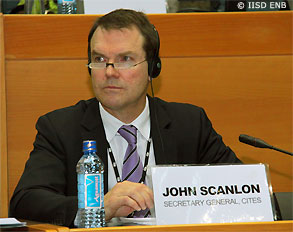The Secretariat of the Convention on International Trade in Endangered Species of Wild Fauna and Flora (CITES) and International Union for Conservation of Nature (IUCN) have signed an agreement to strengthen the cooperation between the two organisations in minimising the illegal killing of and related illegal trade in elephants and other CITES-listed flagship species in sub-Saharan Africa, the Caribbean and the Pacific region.

The agreement was signed in the context of the project known as MIKES (Minimising the Illegal Killing of Elephants and other Endangered Species), funded by the European Union.
Speaking following the signing ceremony, John E. Scanlon, the Secretary-General of CITES, said, “This enhanced collaboration between IUCN and the CITES Secretariat draws upon the comparative advantage of both organisations in advancing our collective efforts to minimise the escalating poaching of, and growing illegal trade in, elephants, as well as to protect other CITES-listed flagship species, such as rhinos, great apes and marine turtles. Through this enhanced collaboration, CITES will benefit from IUCN’s presence on the ground in African elephant range States, as well as in the Caribbean and the Pacific, in stepping up efforts to minimise the illegal killing of these flagship species.”
Echoing these sentiments, IUCN’s Director General Inger Andersen said, “Poaching and illegal wildlife trade have reached unprecedented levels in recent years, pushing many of the most iconic species to the brink of extinction and undermining years of conservation efforts. This is a global challenge which can only be tackled through collective, international action.

“As the world’s largest conservation organisation, IUCN is committed to building effective partnerships to deliver viable solutions to this burning issue. We highly value our close cooperation with the CITES Secretariat in implementing the CITES MIKES Programme and other conservation initiatives. This new agreement will reinforce our collaboration, and provide new opportunities to build upon our mutual strengths. It will also bolster the efforts of IUCN’s global membership to address the illegal wildlife trade, and conserve elephants and other threatened species in African, Caribbean and Pacific States.”
Over recent years, there has been a surge in illegal trade in wildlife, with elephants, rhinos, pangolins and some precious timber species among the most heavily affected. The illegal trade in these species is global in nature and is taking place at an industrial scale. Over 100,000 elephants are estimated to have been poached for their ivory from 2011 to 2013 across the African continent. In 2014, 1,215 rhinos were killed for their horns in South Africa alone – a figure that has risen alarmingly since 2007 when just 13 rhinos were poached.
In combatting illegal wildlife trade, States are increasingly being confronted by transnational organised criminals, and in some cases rebel militia and rogue elements of the military, which have been driving poaching and illegal trade destined for illicit markets. The same illegal infrastructure is used for the illegal trafficking in drugs, weapons and humans.
Increasing collective efforts are underway to combat wildlife crime, yet it continues to be a major problem worldwide, estimated by some to be worth up to 20 billion U.S. dollars a year. This ranks it amongst some of the most serious transnational crimes, including people and arms trafficking.
The new CITES-IUCN agreement will build upon the active participation of elephant range States in the CITES Monitoring the Illegal Killing of Elephants (MIKE) programme over the past 15 years, but with an enhanced focus to include other CITES-listed flagship species threatened by illegal trade, and extending operations to the Caribbean and Pacific regions. The new CITES MIKES project also includes initiatives aimed at strengthening the capacity of wildlife management and law enforcement agencies to combat poaching both within MIKE sites and at the national level.
